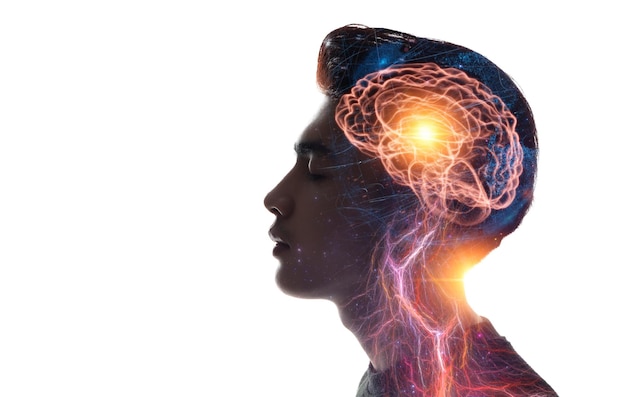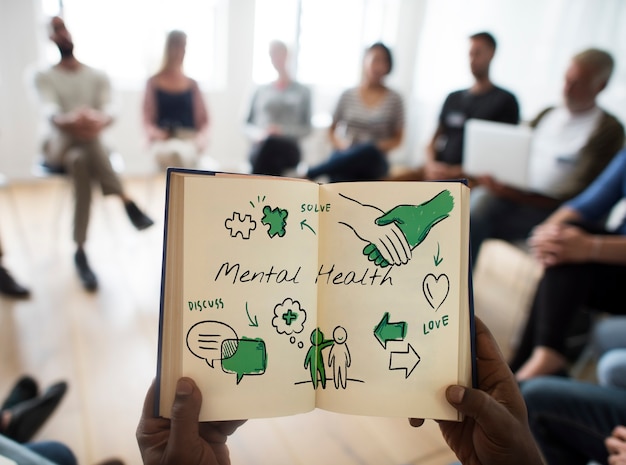Have you ever felt stressed out and physically drained at the same time? Or maybe you’ve noticed that you have more energy and feel happier when you eat healthy and exercise regularly?
That’s the mind-body connection at work. Your physical and mental health are closely linked, and taking care of one can have a positive impact on the other.
In our blog post, we explore the science behind this connection and share tips for taking care of your mind and body.
What is the mind-body connection?

The relationship between our bodies and minds is not a coincidence but a profound symbiotic connection. Research has shown that our physical health significantly influences our mental well-being, and vice versa. Here’s how:
1. The Brain-Body Nexus
Our brains and bodies are in constant communication. Physical health conditions, such as chronic pain, can trigger stress responses in the brain, leading to anxiety or depression. Conversely, persistent stress or emotional trauma can manifest as physical ailments.
2. Neurotransmitters and Hormones
The brain produces neurotransmitters like serotonin and dopamine, closely linked to mood regulation. Regular physical activity and a balanced diet support the production of these mood-enhancing chemicals. Conversely, imbalances can lead to mental health disorders.
3. Inflammation and Immunity
Chronic inflammation, often stemming from poor diet and sedentary lifestyles, is linked to mental health disorders like depression. A strong immune system, nurtured through physical wellness, can protect against mental health challenges.
Why is it important to take care of your mind and body?
Your mind and body are one interconnected system. When you’re stressed, your body releases stress hormones that can have a negative impact on your mental health. And when you’re physically unhealthy, you’re more likely to experience fatigue, anxiety, and depression.
How does physical health affect mental wellness?

The intricate relationship between physical health and mental wellness is a profound one. Our physical well-being exerts a significant influence on our mental state, and the connection between the two is undeniable.
Firstly, physical health impacts our brain’s chemistry. Regular exercise, for instance, stimulates the release of endorphins, often referred to as “feel-good” hormones. These endorphins not only alleviate stress but also enhance mood and reduce symptoms of anxiety and depression.
Secondly, a nutritious diet plays a pivotal role in maintaining mental wellness. Essential nutrients found in fruits, vegetables, and whole grains are not only vital for our physical health but also nourish our brain. Omega-3 fatty acids, for instance, found in fatty fish, are linked to improved cognitive function and reduced risk of depression.
Furthermore, sleep patterns have a profound effect on mental health. Poor sleep can lead to mood disturbances, cognitive impairments, and an increased risk of mental health disorders. Adequate and quality sleep is essential for emotional well-being.
Lastly, chronic physical health conditions can significantly impact mental health. Conditions like chronic pain or illness can lead to depression and anxiety, emphasizing the intricate mind-body connection.
In essence, the state of our physical health is undeniably intertwined with our mental well-being. Nurturing one is an investment in the other, creating a harmonious balance that contributes to overall wellness.
Lifestyle Choices: Architects of Well-Being

Nutrition: Fuel for Body and Mind
A balanced diet rich in whole foods, fruits, vegetables, and lean proteins not only nourishes the body but also supports optimal brain function. For example, omega-3 fatty acids found in fish are associated with reduced depression risk.
Exercise: A Mood Elevator
Physical activity releases endorphins, the body’s natural mood lifters. Regular exercise not only boosts physical fitness but also enhances mental resilience, reducing stress and anxiety.
Sleep: The Restoration Phase
Adequate sleep is essential for mental health. Poor sleep patterns can lead to mood disturbances, cognitive impairments, and an increased risk of mental health disorders.
Stress Management: Mindful Living
Chronic stress can harm both physical and mental health. Mindfulness techniques, relaxation exercises, and hobbies can mitigate the effects of stress.
The Road to Holistic Wellness

Seek Professional Guidance
If mental health challenges persist, it’s crucial to seek professional help. Mental health professionals can provide support and therapies tailored to individual needs.
Community and Connection
Strong social connections are fundamental to mental well-being. Cultivating and sustaining significant relationships can offer emotional strength and a feeling of inclusion.
Holistic Practices
Complementary therapies like yoga, meditation, acupuncture, and massage can enhance overall well-being, fostering the mind-body connection.
The Power of Prevention
Preventing mental health challenges is as vital as treating them. Cultivating a lifestyle that prioritizes physical wellness is a proactive approach to mental health preservation. By making informed choices today, we can shape a brighter, emotionally resilient tomorrow.
Conclusion
The connection between physical health and mental wellness is an undeniable reality. Our bodies and minds are not separate entities but intricately intertwined. Nurturing physical wellness through a balanced diet, exercise, sleep, and stress management is an investment in our mental health. By embracing this profound mind-body connection, we unlock the potential for a harmonious and fulfilling existence.
As we navigate life’s challenges, let us remember that every step taken towards physical wellness is a stride towards mental well-being. In this unity, we find the strength to face life’s complexities with grace and resilience.

